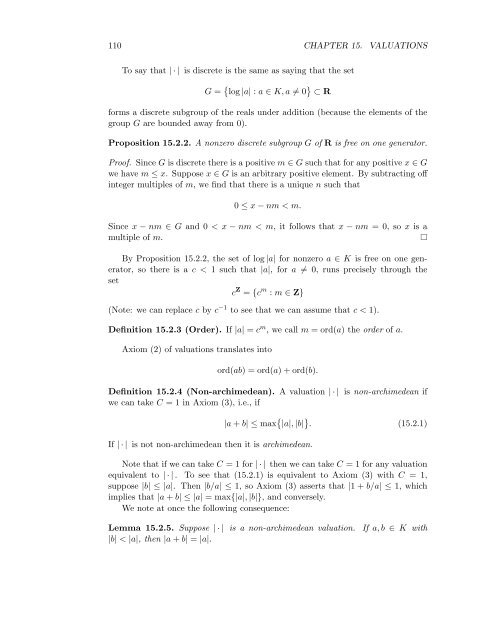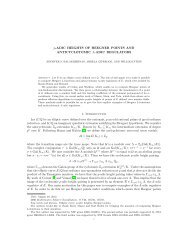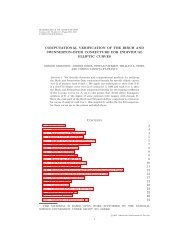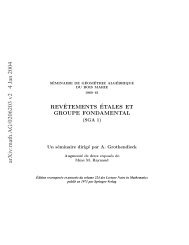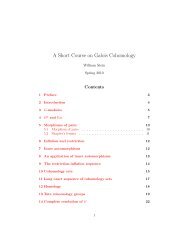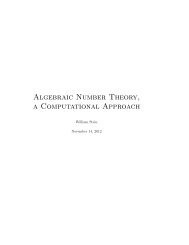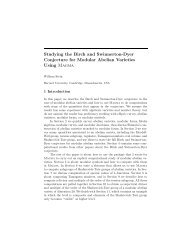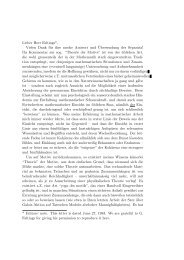A Brief Introduction to Classical and Adelic Algebraic ... - William Stein
A Brief Introduction to Classical and Adelic Algebraic ... - William Stein
A Brief Introduction to Classical and Adelic Algebraic ... - William Stein
Create successful ePaper yourself
Turn your PDF publications into a flip-book with our unique Google optimized e-Paper software.
110 CHAPTER 15. VALUATIONS<br />
To say that | · | is discrete is the same as saying that the set<br />
G = log |a| : a ∈ K, a = 0 ⊂ R<br />
forms a discrete subgroup of the reals under addition (because the elements of the<br />
group G are bounded away from 0).<br />
Proposition 15.2.2. A nonzero discrete subgroup G of R is free on one genera<strong>to</strong>r.<br />
Proof. Since G is discrete there is a positive m ∈ G such that for any positive x ∈ G<br />
we have m ≤ x. Suppose x ∈ G is an arbitrary positive element. By subtracting off<br />
integer multiples of m, we find that there is a unique n such that<br />
0 ≤ x − nm < m.<br />
Since x − nm ∈ G <strong>and</strong> 0 < x − nm < m, it follows that x − nm = 0, so x is a<br />
multiple of m.<br />
By Proposition 15.2.2, the set of log |a| for nonzero a ∈ K is free on one genera<strong>to</strong>r,<br />
so there is a c < 1 such that |a|, for a = 0, runs precisely through the<br />
set<br />
c Z = {c m : m ∈ Z}<br />
(Note: we can replace c by c −1 <strong>to</strong> see that we can assume that c < 1).<br />
Definition 15.2.3 (Order). If |a| = c m , we call m = ord(a) the order of a.<br />
Axiom (2) of valuations translates in<strong>to</strong><br />
ord(ab) = ord(a) + ord(b).<br />
Definition 15.2.4 (Non-archimedean). A valuation | · | is non-archimedean if<br />
we can take C = 1 in Axiom (3), i.e., if<br />
If | · | is not non-archimedean then it is archimedean.<br />
|a + b| ≤ max |a|, |b| . (15.2.1)<br />
Note that if we can take C = 1 for | · | then we can take C = 1 for any valuation<br />
equivalent <strong>to</strong> | · |. To see that (15.2.1) is equivalent <strong>to</strong> Axiom (3) with C = 1,<br />
suppose |b| ≤ |a|. Then |b/a| ≤ 1, so Axiom (3) asserts that |1 + b/a| ≤ 1, which<br />
implies that |a + b| ≤ |a| = max{|a|, |b|}, <strong>and</strong> conversely.<br />
We note at once the following consequence:<br />
Lemma 15.2.5. Suppose | · | is a non-archimedean valuation. If a, b ∈ K with<br />
|b| < |a|, then |a + b| = |a|.


